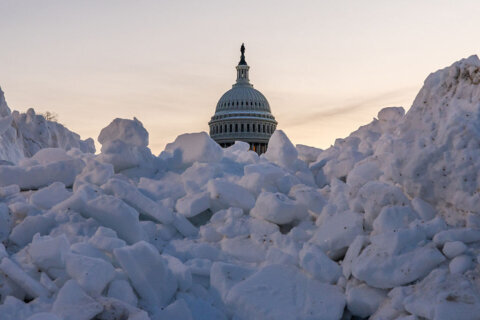Many second-grade students struggled with reading skills at Brookfield Elementary in Fairfax County, Virginia, last year. As a result, the school appointed two separate teachers to lead sessions to help them get back on track.
School leaders were particularly concerned about one student, Justin, who could only identify a few letters from a sheet with the alphabet on it. Due to his lack of knowledge of the letters, he struggled with sounds, according to Jennings Johnston, a literacy interventionist at the school.
Justin participated in Johnston’s pull-out sessions, which last at least 20 minutes and teach students things like how to use letter sounds. The position she holds is funded using federal stimulus money.
When Justin returned to the sessions this year, qualifying based on school testing data, Johnston noticed he was able to retain concepts and then teach them to her and other students in the group.
He graduated from the program and is now in his regular class full time during the literacy lessons — but there are dozens of others in need of the extra help.
Johnston said the students in third grade were kindergartners in 2020. She added when it comes to academic data, the third graders are essentially equal with current second graders.
“That just shows you that there are a lot of gaps,” Johnston said. “And that we need to work with those students a lot to help them get those skills and be back in the classroom.”
In the three years since the coronavirus pandemic prompted schools across the D.C. region to close and then, in many cases, move to virtual learning, it’s become increasingly evident to educators how far behind many students are, and how pandemic-era closures impacted their mental health.
The latest results from the National Assessment of Educational Progress, known as the nation’s report card, detailed significant drops in reading and math scores. A recent Centers for Disease Control and Prevention study found 60% of teen girls in the U.S. reported feeling persistently sad or hopeless.
In interviews with WTOP, school superintendents who started their jobs in the middle of the pandemic say schools will likely never revert back to the way they were before the pandemic.
“We’re not going back to what we thought was normal,” Prince William County Superintendent LaTanya McDade said. “There’s a new normal in our schools.”
‘Children’s education is not a luxury’
One of Shawnna Yashar’s three Fairfax County students was 7 years old at the time Virginia’s largest school system transitioned to virtual learning. He has a learning disability, and she grew frustrated watching him try to learn via a computer screen.
Teachers shared instructions online and expected him to do projects on his own — but he had trouble reading the instructions. Both Yashar and her husband took time off work to help their children, and at one point, she quit her job to be able to read the instructions to her struggling son.
Yashar’s kids weren’t learning or socializing with friends. Instead, she watched as they stared at a computer screen for hours every day.
As D.C.-area school systems remained closed, parents’ involvement became integral to their students’ success in the virtual environment. They watched as school systems in some southern states and in Europe reopened with masks and other mitigation requirements. They wondered when the local jurisdictions would follow suit.
“I’ll never understand why we didn’t prioritize children’s needs over adults,” Yashar said. “When I saw things like the liquor stores opening and the bars opening, and I saw schools continuing to be closed, I’ll never understand that. Children’s education is not a luxury, it’s not a nice-to-have. It’s a necessary part of society to make sure that our children are educated.”
Arlington parent Alison Babb noticed much of the same. In March 2020, she had a second grader and kindergartner attending Arlington Public Schools. When schools closed, she and her husband crafted a schedule. It included morning yoga before a transition to science. Her husband was in charge of handwriting.
They bought math books, flashcards and did whatever they could to keep their kids on track. They had their kids make change with coins.
But when it became clear that schools would remain closed in fall 2020, Babb did a Google search for “cheap Arlington private schools.” They were invited in for a tour, and were pleased to see reading maps and books. Starting in August 2020, Babb’s kids attended the private school and stayed there for the next two years. Now, they’re back in Arlington Public Schools and performing on grade level.
“During school closures, my kids could go to restaurants, movie theaters, they could walk in with me to any store at the mall, but they couldn’t walk into their classroom, they couldn’t walk into their public school,” Babb said.
It’s clear, she said, “how important classroom teachers are, and how valuable they should be treated, and how we should be prioritizing them in budgets and staff hiring.”
Kara Klaas, a Prince William County parent, described teachers’ efforts as “herculean.” She noticed the “tremendous loss of learning” in the virtual environment.
“It was an impossible situation for everyone, from the teachers, to the parents to the students,” Klaas said.
Fairfax County parent Rory Cooper watched as students fell behind in basics, like reading, math and science.
“I can’t teach my kids Algebra,” Cooper said. “I can teach them how to be good citizens of the world.”
‘Every decision was going to be controversial’
In 2021, several new superintendents were tasked with leading academic and social-emotional recovery efforts.
Monifa McKnight served as interim superintendent of Montgomery County Public Schools starting on June 1, 2021. She took over after Jack Smith retired, and earned the permanent role a year later. In D.C., Mayor Muriel Bowser appointed Christina Grant as superintendent in the summer of 2021. In Prince William County, McDade took over the state’s second-largest school system around the same time.
They and their colleagues worked through changes in masking, testing and quarantine requirements while also focusing on helping overcome student learning loss and teacher burnout.
McKnight was sitting in a hearing in 2020 and noticed many in the room were getting distracted. One speaker was so disturbed, they requested the staff’s attention. What McKnight didn’t know at the time, she said, was the first COVID-19 case had been identified in Maryland. An hour later, she learned it was in Montgomery County.
Students transitioned to virtual learning, leaving pre-K teachers doing various movements to keep the youngest students engaged. When they’d walk away, McKnight said, the instructors would yell their names.
McKnight navigated changes in the county’s masking and quarantine guidelines and had to close some school buildings again as omicron spread rapidly in early 2022. She said she doesn’t have any regrets about those challenging decisions, but described the abnormal school years as “one of the most complex situations I know that I have ever lived through.”
It was complicated to be learning about pivotal information through news conferences, and often at the same time as the public, she said.
The pandemic’s legacy in Montgomery County, the state’s largest school system, isn’t all negative, McKnight maintains. For one, testing data from the middle of the school year revealed a 3% to 6% increase in kindergarten through second graders reaching literacy benchmarks, compared to the start of the year, she said.
“The data speaks to the fact that students being in person and us being able to have that personal interaction with them actually works,” McKnight said.
Students have also been more proactive in communicating their needs. Third-graders recently told McKnight that before taking a test, they’d like five minutes to work with Legos or a Rubik’s Cube at their desk. High schoolers told her walking outside for 10 to 15 minutes for a mental break is valuable.
The school system has grappled with a recent rise in incidents in bathrooms, antisemitism and opioid use. McKnight said students have to feel supported and have a sense of belonging, and that has to come at the community level.
“That’s what keeps me up at night,” she said. “Because I know that as superintendent, I can’t achieve that alone.”
On March 11, 2020, Grant was working in Philadelphia when she got a call saying schools would close for two weeks. It turned out to be longer, and since arriving in D.C., she’s spearheaded efforts in high-impact tutoring and invested in new curriculum, supporting things like the science of reading.
D.C. has also adopted a test-to-return strategy after breaks, requiring proof of a negative COVID-19 test to return to school. That program, Grant said, will continue through the end of the school year. The city is also investing in student and staff mental health, she said, using a five-year grant to recruit and retain school-based mental health professionals.
“You hear that people like to rise in the face of crisis,” Grant said. “And we really stood aligned together.”
When McDade arrived to lead Prince William County schools, she was ecstatic at the fact that 97% of families indicated they would return in person in fall 2021. However, she said, the county was ill-prepared for the challenges it faced.
“What was expected of educators and leaders was for us to be health professionals, which we are not, from contact tracing to vaccination,” McDade said. “It just didn’t stop.”
The school system ordered coronavirus test kits, as the pandemic was still present. The county, McDade said, spent most of the 2021-22 school year making sure students were socially, emotionally and mentally well in addition to providing them with a holistic education.
Prince William County is also grappling with a rise in student absences, which McDade said hinders recovery efforts.
The pandemic normalized technology use in classrooms, a positive that McDade suspects is advancing the school system’s education plans.
Now, the county is investing in things like mental wellness, in addition to academic matters. But sometimes, McDade reflects on how public education became politicized and polarizing in recent years.
“Every decision was you were stuck between a bad and what’s worse,” McDade said. “Every decision was going to be controversial, because every decision was made with limited visibility into a lot of the data that was needed in understanding the different needs of our families.”
‘Teaching to an empty seat’
When Johnston, the Brookfield Elementary literacy interventionist, was teaching kindergarten virtually, a lot of kids would get up and walk away. She’d reach out to families and encourage them to have their kids remain seated, but it wasn’t something she could control.
Even when students returned in person, with masks, challenges remained.
“It’s very challenging to teach a child sounds of letters when you can’t show your mouth, or actually get that sound out because it’s even muffled sometimes, via computer and via mask,” she said.
Brookfield Principal Ellen Mukai said ESSER funding has also been used to buy books to help students decode and sound out words, with the hope of having more success stories like Justin, who was able to get back on track.
School systems across the D.C. region have spent federal funding on curriculum materials and high-impact tutoring. But as students work to catch up, leaders wonder how they’ll continue to help students do so when the funds are no longer available.
“How do we grapple with the fact that those needs are still existing and those dollars will no longer be available?” McDade, with Prince William County, said.








